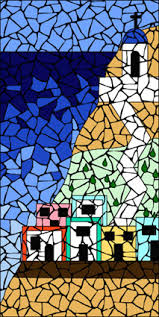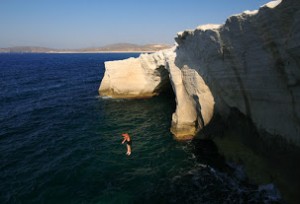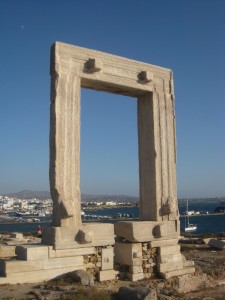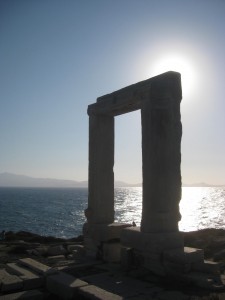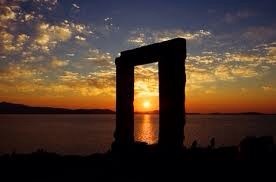“Everything here speaks now as it did centuries ago, of illumination. Here the light penetrates directly to the soul, opens the door and windows of the heart, makes one naked, exposed, isolated in a metaphysical bliss which makes everything so clear … To know Greece well, would take a lifetime but to fall in love with it takes only an instant”.
— Henry Miller, The Colossus of Maroussi
Over two hundred years ago an Englishman created a children’s toy out of two slanted mirrors and a tube containing beads and bits of glass that formed colorful patterns as the tube was turned. To name it he combined three Greek words: kalos – good or beautiful; eidos– shapes; and “scope” from skopein – to look at. Although the fragments of the toy fall at random, thanks to the replication of the mirrors they create ever-changing symmetrical designs, shapes worth examining carefully.
Greece is a kaleidoscope, endless in variety, never the same from one moment to the next, astonishing the eye in every turn. No matter where you look, you are struck by beauty. In spring, wild mountain slopes in the north of Greece burst into a tapestry of colors: scarlet poppies, white and yellow daisies, mauve heather, and the magenta flowers of the trees. On the southern islands of the Cyclades, piled with white sugar-cube houses, resplendent sunsets send shadows bouncing up steep flights of steps as donkeys descend, picking their way home for the night. In every harbor, fishermen sit cross-legged on the docks, mending their yellow nets as the setting sun bathes the sky blooded burgundy before sinking into Homer’s aptly described wine-dark sea (ancient Greek did not have a word for “blue”; I will have more on Greek etymology in a longer, subsequent post).
In Greece the intensity of the sun creates deep velvet shadows against the whitewashed walls and intensifies the fanciful colors that villagers use to embellish their doorways and gates -turquoise and lavender, salmon pink and lime green, blood red and sapphire blue. And in every shadow lurks the silhouette of a cat.
On my first visit to Greece in the 1980s, l recall climbing the hill of the Acropolis and seeing the glowing marble of the Parthenon. Alone on that hill overlooking Athens I felt an understandable deep connection to this land (both my maternal and paternal grandparents were from Epirus, as were several of my uncles and aunts). I spent only a week there the first time, but knew I would return. I made 12 subsequent trips and now call Milos my home.
As you probably surmise by now, this will not be a dispassionate series of articles. But in this series of impressions I will write about Greece, I do not intend to be idealistic. The glory that was Greece is a hard act to follow. I will not focus on the aspects of the current century’s culture that have torn the fabric of the Greek tapestry, but in later posts in this series I will comment on the current political and social imbroglio. Greece is a land of many realities and all deserve an analysis. But you need to venture inland … be it mountains or islands … where most Greeks are born and raised because it is there, not in the frantic urban rush or Athens or Salonika, where one finds the true Greek character and the overwhelming Greek hospitality.
But I find it striking that it is still possible to travel Greece and find it the way I will explore in this series, even in the most popular tourist spots. You may need to rise at dawn, see those incredible sun rises, and wander the streets before the T-shirts and postcards are hung out for the tourists disembarking from their tour buses and cruise ships. But it is still there for those who have eyes to see. And the past is always a living present. A Greek friend was digging the foundation for a garage to his home and found a tomb filled with gold jewelry from the Hellenistic period. These types of discoveries happen every year in Greece. A few summers ago my wife and I were swimming off the coast of Naxos and found an amphorae on the sea floor, testament to the time Greece was the shopping center of the world.
And the light, oh the light of Greece. It highlights an extraordinary landscape of mythic dimensions. What elements are combined alchemically to produce that light even professional photographers do not know. It plays havoc with film and light meters. I have photographed the “Great Door” at the Temple of Apollo in Naxos at almost every hour to capture images not like the standard postcard and I am amazed by the light. And no picture ever the same.
I know of no other land where the shadows are actually purple. I have traveled all over the world and the light is unparalleled: the way this light reflects upon the whitewashed towns, providing shape to the plasticity of form in the organic way in which houses are formed, often as if growing out of the rocks. Then, house and rocks are both whitewashed and do become one form to the eye. One can understand how in this land the ancient people just took for granted that the gods would come down from Mount Olympus and commingle with mortals.
There are no harsh extremes in the Greek landscape, no towering Alps. Nature built Greece on a human scale, and the people followed, creating gods and designing their temples to human scale. The idea of human proportion as the basic unit completely pervades Greek thought. No other land could have produced such a people, and this land could have produced nothing else.
Johann Wolfgang von Goethe … the German poet, dramatist, and novelist, who made a major contribution to world literature with his themes of individuality and social concerns which reflected a profound understanding of human interrelationships … had vast correspondence with his contemporaries, influencing writers and thinkers of his own time and helped shape the literary movements of the nineteenth century. Goethe is widely considered to be one of the most versatile and prolific figures in all world literature. He wrote extensively about the Greeks and moved many writers to explore Greek culture.
He noted about the Greeks that “of all peoples, the Greeks have dreamt the dream of life best”. Yes, the quote is steeped in the Romantic notion of nostalgia for the past. Being a Romantic thinker himself, Goethe believed that the Greeks “got it right” and in examining their past there was a chance for replication in the present. By this he meant the Greeks excelled in so many areas. Indeed, if one studies the Greeks in any detail, one will immediately realize that the Greeks excelled in architecture, literature, medicine, philosophy, and all the arts. Aeschylus, Agatharchos, Archimedes, Aristotle, Demosthenes, Epicurus , Hippocrates, Plato, Ptolemy, Pythagoras, Socrates, Sophocles. And so many others. Even today we read and contemplate what these men have written. They are quoted continuously.
Even I have had an immersion into the ancients. I took a course on architecture at the new Acropolis Museum in Athens. Seen from any angle, the Parthenon seems to float at the highest point of the Acropolis. But its majesty is a kind of optical illusion, achieved by an application of the laws of perspective so sophisticated that succeeding architects have never been able to equal it. The ancient architects … Mnesikles and Callicrates … created its perfectly linear appearance without using a single straight line. From the slightly convex base to the fluted Doric columns that taper toward the top and lean toward the center, it was designed to attract and beguile the human eye. Even now with the colossal gold and ivory statue of the goddess long gone, the walls shattered by the explosion of gunpowder stored inside by the Turks, and the pediments denuded of the reliefs shipped off to the British Museum by Lord Elgin, the first sight of the Parthenon … especially by moonlight … fills one with awe.
It is my intent through this series to offer a meze — an aperitif to pique the appetite and awaken a yearning to experience more, an invitation to come to Greece or at least read more about Greece and partake in an endless feast.
Gregory Bufithis
Founder and Executive Director
The Alice Nikki Vellios Foundation

